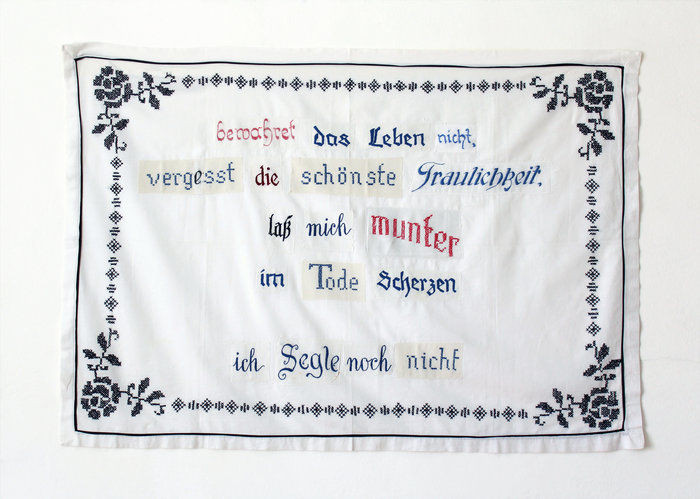Daniel Spoerri
26 Jun - 02 Aug 2014
DANIEL SPOERRI
Rost Idole & Fadenscheinige Orakel
26 June – 2 August 2014
It is known that Daniel Spoerri also collects textiles and often uses pieces of cloth with embroidery as a surface for his trap paintings and other assemblages. The saying “the end of all art does not spell the end of refined culinary art” is the title of a painting for the Spoerri catalogue on Eat Art
In 2014, he began analysing the sayings that good housewives would spend evenings embroidering onto so-called cover cloths – usually these sayings referred to everyday household chores – using this linguistic material to come up with new texts. A veritable deluge of idiosyncratic sentences and lessons evolved within a short time. Part of these “flimsy oracles” can now be perused at the Galerie Krinzinger. Spoerri may have had Tristan Tzara, the Romanian Dadaist in mind, who offered a recipe for making a poem: you take a newspaper, cut out the works and mix them again.
The exhibition will also feature bronzes from a series titled “Prillwitzer Idole”.
These large sculptures covered with a rusty patina are modelled after roughly sculpted bronze figures that were created in north-eastern Germany in the 18th century. After discovering them there on an adventurous ʻtreasure huntʼ, Daniel Spoerri let them inspire him to produce large-sized figures. Between 2005 and 2011 more than thirty sculptures were modelled after the “Prillwitzer Idole”..
Barbara Räderscheidt
Rost Idole & Fadenscheinige Orakel
26 June – 2 August 2014
It is known that Daniel Spoerri also collects textiles and often uses pieces of cloth with embroidery as a surface for his trap paintings and other assemblages. The saying “the end of all art does not spell the end of refined culinary art” is the title of a painting for the Spoerri catalogue on Eat Art
In 2014, he began analysing the sayings that good housewives would spend evenings embroidering onto so-called cover cloths – usually these sayings referred to everyday household chores – using this linguistic material to come up with new texts. A veritable deluge of idiosyncratic sentences and lessons evolved within a short time. Part of these “flimsy oracles” can now be perused at the Galerie Krinzinger. Spoerri may have had Tristan Tzara, the Romanian Dadaist in mind, who offered a recipe for making a poem: you take a newspaper, cut out the works and mix them again.
The exhibition will also feature bronzes from a series titled “Prillwitzer Idole”.
These large sculptures covered with a rusty patina are modelled after roughly sculpted bronze figures that were created in north-eastern Germany in the 18th century. After discovering them there on an adventurous ʻtreasure huntʼ, Daniel Spoerri let them inspire him to produce large-sized figures. Between 2005 and 2011 more than thirty sculptures were modelled after the “Prillwitzer Idole”..
Barbara Räderscheidt

